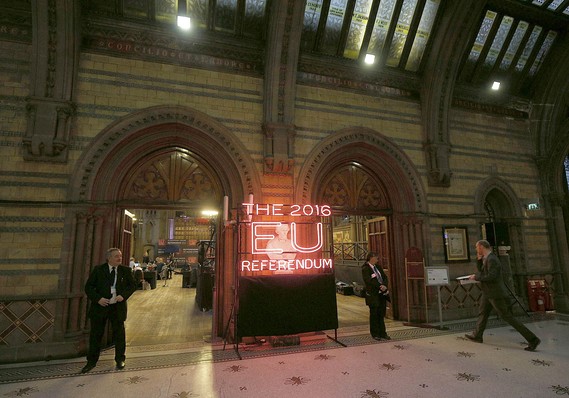An illuminated EU referendum sign in Manchester Town Hall on Thursday.
It’s official — the U.K. has voted to leave the European Union. There’s a sense of shock after opinion polls suggested voters would reject a Brexit.
Stock markets in London and Europe sold off sharply at the open, with British bank shares taking a particular hit. The pound is on a downward trajectory.
British Prime Minister David Cameron announced he will step down Friday morning, saying the negotiations for withdrawal from the EU should be carried out by a new leader. His replacement is expected to be selected by October.
“The will of the people to leave the EU must be respected,” British Prime Minister David Cameron said in a statement Friday. “We must now prepare for a negotiation with the European Union.”
-
Bank of England Governor Mark Carney sought to calm financial markets on Friday morning, vowing to take all necessary measures to ensure financial stability after the U.K. voted to leave the European Union.
In a public statement after the historic vote to Brexit, the central bank governor said the BOE is closely monitoring the fallout from the referendum and is working with other central banks to preserve stability.
“We have taken all necessary steps to prepare for this event,” Carney said. “We won’t hesitate to take more measures.”
The BOE governor also said the bank stands ready to provide £250 billion ($344.48 billion) in additional funds to the financial system.
-
Analysts have started reacting to the news that U.K. Prime Minister David Cameron has resigned.
“This a complete disaster but this was expected. Now we have political uncertainty, economic uncertainty, consumer confidence may crash even further and the property market may be hit even harder,” said Naeem Aslam, chief market analyst at ThinkForex, in a note.
“We have an environment under which we do not know who is going to lead the country. Bookies will have another thing to play – who will lead the country and names like Boris and Nigel Farage have popped up.
-
The U.K.’s Prime Minister David Cameron said Friday morning he will resign, after Britain voted to leave the European Union in a hotly fought referendum. Cameron had been campaigning for the “remain” side, arguing the U.K. would be safer, stronger and better off economically inside the union.
During a speech after the Brexit results were announced, the prime minister said the break-up negotiations with Europe need to take place under a new leader. The new prime minister will take over in October, he said.
“Leaving Europe is not the path I recommended,” Cameron said. “I will do everything I can to help the U.K. succeed.”

-
Stocks are selling off in the U.K. and Europe as the markets open, and it’s carnage out there. British banks are taking a particular hit, as are home builders. Trading was halted in numerous stocks in Europe at the start, though they’re tricking back.
Here’s a rundown, but this is likely to be a snapshot of the situation as volatility hits:
– FTSE 100 now down 7.6%
– Stoxx 600 falls 8.2%
– Stoxx banking index slumps 10%
– Royal Bank of Scotland tanks 28%
– Taylor Wimpey loses 25%
– Societe Generale plungs 30%
– Randgold Resources rallies 28%
– Gold jumps 5% to $1,328 an ounce
– Oil drops 4.8% to $47.72 a barrel
– Dow average stock futures lost 522 points to 17,397 -
Shortly before 7:30 a.m. London time, or 2:30 a.m. Eastern Time, Jenny Watson, chairperson of the United Kingdom Electoral Commission, made the official declation that the U.K. has voted to leave the union, with 51.9% backing an exit vote
-
The U.K. stands to lose its AAA credit rating with Standard & Poor’s Ratings Services, the Financial Times reports on Friday.
Moritz Kraemer, the chief ratings officer for S&P, confirmed to the newspaper that he expects the political and economic consequences of a Brexit to lead to a credit downgrade in the near future.
“We think that a AAA-rating is untenable under the circumstances,” Kraemer told the FT.
Brussels wakes up to a new reality reality — it has to unwind a 43-year-old relationship with the U.K. after the “leave” side won in the closely watched Brexit referendum.
-
Dutch Prime Minister Mark Rutte, whose country holds the rotating presidency for the EU, will meet with European Commission President Jean-Claude Juncker and European Council President Donald Tusk, Friday morning in Brussels, according to The Wall Street Journal.
Later in the day, European and foreign affairs ministers will have Brexit on top of their agenda at a meeting in Luxembourg.
Leading European politicians reacted with shock to the decision in the early hours of Friday morning. Alexander Stubb, former Finnish prime minister, wished it was all a terrible dream.














